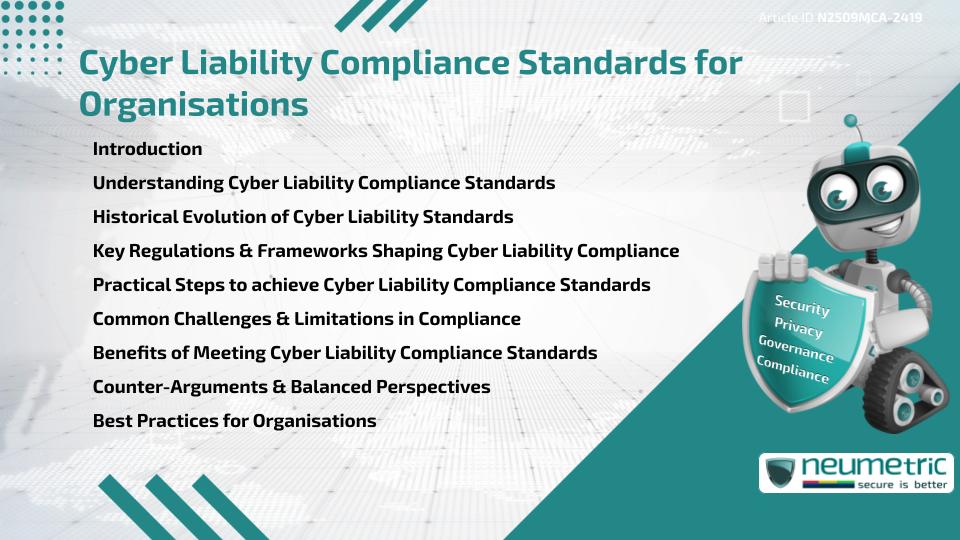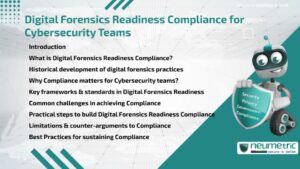Table of Contents
ToggleIntroduction
Cyber Liability Compliance standards are essential for organisations aiming to reduce Risks associated with Data Breaches, Cybercrime & Regulatory penalties. These standards set the Framework for how businesses must manage Cybersecurity responsibilities to limit liability when Incidents occur. They cover requirements such as Data Protection, Breach notification, Risk Assessments & Contractual obligations with Third Parties. By following Cyber Liability Compliance standards, organisations can safeguard Sensitive Information, demonstrate Accountability & avoid reputational harm. This article explores the history, regulations, challenges, benefits & Best Practices related to Cyber Liability Compliance standards.
Understanding Cyber Liability Compliance Standards
Cyber Liability Compliance standards refer to legal, regulatory & industry-based rules that dictate how organisations manage Cybersecurity Risks. These standards ensure that businesses take proactive measures to prevent Incidents & Respond effectively if they occur. Much like safety regulations in Manufacturing, Cyber Liability standards create a baseline of Accountability that protects both Organisations & Customers.
Historical Evolution of Cyber Liability Standards
The concept of Cyber Liability emerged in the late 20th century when digital systems began storing large volumes of Sensitive Data. Early regulations were sector-specific, focusing mainly on Financial services & Healthcare. As Cyber Threats grew in scale & sophistication, governments worldwide introduced comprehensive frameworks to define how organisations should manage liability related to Cybersecurity Incidents. Over time, these frameworks expanded beyond Compliance to also encompass Risk Management & Insurance considerations.
Key Regulations & Frameworks Shaping Cyber Liability Compliance
Several regulations & standards define Cyber Liability Compliance standards:
- General Data Protection Regulation [GDPR]: Imposes strict Data Protection & Breach notification requirements.
- Health Insurance Portability & Accountability Act [HIPAA]: Sets liability standards for protecting patient health data.
- Payment Card Industry Data Security Standard [PCI DSS]: Requires organisations handling payment data to follow strict Security Controls.
- ISO 27001: Provides an international Standard for Information Security management systems.
- NIST Cybersecurity Framework: Outlines Best Practices for reducing Cybersecurity Risks & liability.
Practical Steps to achieve Cyber Liability Compliance Standards
To align with Cyber Liability Compliance standards, organisations should:
- Conduct regular Risk Assessments to identify Vulnerabilities.
- Establish Data Protection Policies covering storage, access & sharing.
- Implement Breach notification procedures as mandated by law.
- Use encryption, Access Controls & Monitoring Tools to secure data.
- Train Employees on Compliance & Cybersecurity awareness.
- Review contracts with Vendors to ensure Third Party Compliance obligations are met.
Common Challenges & Limitations in Compliance
Organisations face challenges such as the cost of implementing Compliance measures, especially for small & medium enterprises. The complexity of overlapping regulations across jurisdictions adds further difficulty. Additionally, Cyber Liability insurance Policies may have exclusions, leading to gaps between Compliance & actual protection. Misinterpretation of Compliance Requirements can also increase legal exposure.
Benefits of Meeting Cyber Liability Compliance Standards
Organisations that meet Cyber Liability Compliance standards enjoy multiple benefits:
- Reduced Risk of legal penalties & fines.
- Greater resilience against Cyber Threats.
- Improved Trust & Reputation with Clients & Partners.
- Stronger bargaining power in insurance coverage negotiations.
- Enhanced ability to respond to & recover from Incidents.
Counter-Arguments & Balanced Perspectives
Some argue that Compliance with Cyber Liability standards can create a “Checklist Mentality” where organisations focus solely on meeting minimum requirements rather than truly improving security. Others believe that the Financial & Operational burden of Compliance disproportionately affects smaller organisations. A balanced approach requires going beyond Compliance to embrace comprehensive Risk Management while scaling efforts to the organisation’s size & resources.
Best Practices for Organisations
- Align Compliance programs with broader Cybersecurity Strategies.
- Automate Compliance monitoring & reporting where possible.
- Update Policies regularly to reflect evolving Regulatory requirements.
- Engage external Auditors or consultants to validate Compliance efforts.
- Integrate Cyber Liability considerations into Business Continuity planning.
Conclusion
Cyber Liability Compliance standards are a cornerstone of modern Cybersecurity Governance. They provide organisations with the frameworks needed to manage liability Risks, protect Sensitive Information & ensure Accountability. By understanding the historical evolution, regulatory context & practical challenges, organisations can achieve Compliance while strengthening their overall security posture.
Takeaways
- Cyber Liability Compliance standards define how organisations manage legal & security obligations.
- Regulations like GDPR, HIPAA, PCI DSS, ISO 27001 & NIST shape liability requirements.
- Compliance requires Policies, Breach notification processes & Employee Training.
- Challenges include high costs, overlapping regulations & policy exclusions.
- A balanced approach combines Compliance with broader Risk Management strategies.
FAQ
What are Cyber Liability Compliance standards?
They are regulatory & industry rules that define how organisations manage Cybersecurity Risks & liabilities.
Why are Cyber Liability Compliance standards important?
They reduce legal exposure, protect Sensitive Data & improve organisational resilience against Cyber Threats.
Which regulations set Cyber Liability Compliance standards?
GDPR, HIPAA, PCI DSS, ISO 27001 & the NIST Cybersecurity Framework are key examples.
Do Cyber Liability Compliance standards apply to Small Businesses?
Yes, though requirements may be scaled, Small Businesses must still meet applicable Compliance obligations.
What challenges arise in meeting Compliance standards?
Challenges include costs, complex overlapping regulations & limitations in insurance coverage.
How do these standards affect Cyber Liability insurance?
Meeting standards often reduces premiums & improves eligibility for broader insurance coverage.
Can Compliance alone prevent cyber Incidents?
No, Compliance provides a Framework but must be combined with proactive security practices for effective protection.
Need help for Security, Privacy, Governance & VAPT?
Neumetric provides organisations the necessary help to achieve their Cybersecurity, Compliance, Governance, Privacy, Certifications & Pentesting needs.
Organisations & Businesses, specifically those which provide SaaS & AI Solutions in the Fintech, BFSI & other regulated sectors, usually need a Cybersecurity Partner for meeting & maintaining the ongoing Security & Privacy needs & requirements of their Enterprise Clients & Privacy conscious Customers.
SOC 2, ISO 27001, ISO 42001, NIST, HIPAA, HECVAT, EU GDPR are some of the Frameworks that are served by Fusion – a SaaS, multimodular, multitenant, centralised, automated, Cybersecurity & Compliance Management system.
Neumetric also provides Expert Services for technical security which covers VAPT for Web Applications, APIs, iOS & Android Mobile Apps, Security Testing for AWS & other Cloud Environments & Cloud Infrastructure & other similar scopes.
Reach out to us by Email or filling out the Contact Form…





